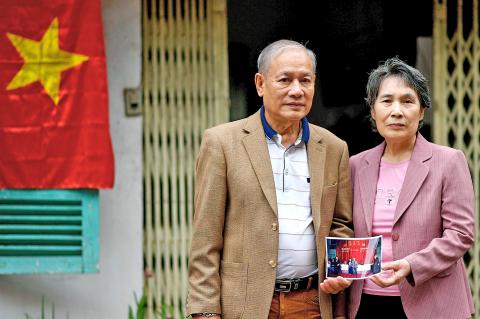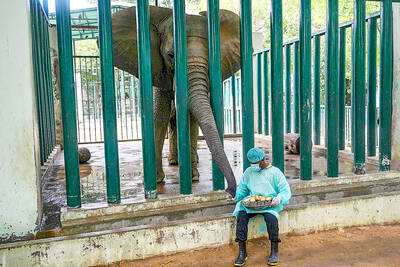A young couple with matching expressions stare nervously into the camera with deep brown eyes. He, a Vietnamese student, has just met the love of his life. She, a North Korean, is forbidden to love him back.
It was 31 years after Pham Ngoc Canh, 69, took that first photo of Ri Yong-hui, before the two were finally allowed to get married in 2002, when North Korea took the rare step of allowing one of its citizens to marry a foreigner.
“From the moment I saw him, I was so sad because I felt it would be a love that could never be realized,” said Ri, 70, speaking from the small Soviet-era apartment she and Canh share in the Vietnamese capital, Hanoi.

Photo: AFP
Now enjoying freedoms in Vietnam that would be impossible in North Korea, Pham and Ri are hoping the upcoming summit between US President Donald Trump and North Korean leader Kim Jong-un in Hanoi would help end hostilities with Pyongyang.
“If you’re a North Korean, you want to see this resolved, but politics is complicated,” Ri said. “When people first heard Kim Jong-un decided to meet Trump, they expected reunification to happen soon. But that’s hard to realize in just one or two days. I hope things work out well.”
Today one of Asia’s fastest-growing economies and integrated into the international community, Vietnam has been touted as a model for isolated and impoverished North Korea to follow.
Back in 1967, as Vietnam and the US were locked in war, Pham was one of 200 Vietnamese students sent to North Korea to gain the skills the state needed to rebuild itself once the war was over.
Several years later, during a chemical engineering apprenticeship at a fertilizer factory on North Korea’s east coast, Pham spotted Ri working in a laboratory.
“I thought to myself: ‘I must marry that girl,’” said Pham, who eventually plucked up the courage to approach Ri and ask her for her address.
Ri obliged: Her friends had told her one of the “Viet Cong” working at the factory looked just like her, and she was curious.
“As soon as I saw him, I knew it was him,” Ri said. “He looked so gorgeous”.
“Until then, when I had seen so-called handsome guys I hadn’t felt anything, but when he opened the door, my heart just melted,” she said.
But there were challenges. Until this day in North Korea, and in Vietnam at the time, relationships with foreigners are strictly forbidden.
After the couple exchanged several letters, Ri agreed to let Pham visit her at home.
He had to be careful. A Vietnamese comrade had been beaten when he had been found with a local girl.
Dressed in North Korean clothes, Pham embarked on the three-hour bus journey and 2km walk to Ri’s home — a trip he repeated monthly until he returned to Vietnam in 1973.
“I went to her house secretly, just like a guerrilla,” Pham said.
Upon his return to Hanoi, Pham felt disillusioned. The son of a high-ranking cadre, Pham refused to join the Communist Party, forgoing the bright future the state had planned for him.
“I just couldn’t agree with a socialism that stops people from loving each other,” Pham said.
Five years later, in 1978, the Vietnamese chemical engineering institute Pham was attached to organized a trip to North Korea.
He asked to join and managed to meet Ri. However, every time they saw each other, Ri said, she became more heartbroken at the thought that they might never meet again.
He had brought with him a letter he had written to the North Korean leadership, begging for permission for them to marry.
“When she saw the letter, she asked: ‘Comrade, do you intend to persuade my government?’” said Pham, who never sent the letter and instead asked Ri to wait for him.
Later that year, Vietnam invaded Cambodia, triggering a border war with China. With North Korea on the side of Beijing and Phnom Penh, the couple stopped writing.
“My mother was crying while caring for me,” Ri said. “I think she knew that I was lovesick.”
In 1992, Pham again managed to get himself on a trip to North Korea as a translator with a Vietnamese sporting delegation, but could not meet Ri. When he returned to Hanoi, Pham found Ri had sent him a letter.
She still loved him.
In the late 1990s, North Korea was gripped by a devastating famine and a desperate delegation from Pyongyang visited Hanoi to ask for rice. Vietnam, which by then had undertaken major economic and political reforms and re-engaged with the West, refused.
Pham was so concerned for Ri and her people that he raised 7 tonnes of rice in donations from friends to send to North Korea.
It was an act of generosity that finally paved the way for he and Ri to reunite: The North Koreans learned of Pham’s act and agreed he could marry Ri and live in either country — provided Ri maintained her North Korean citizenship.
In 2002, the two finally married in the Vietnamese embassy in Pyongyang, and settled into their new life together in Hanoi, where they still live today.
“In the end, love beat socialism,” Pham said.

NO EXCUSES: Marcos said his administration was acting on voters’ demands, but an academic said the move was emotionally motivated after a poor midterm showing Philippine President Ferdinand Marcos Jr yesterday sought the resignation of all his Cabinet secretaries, in a move seen as an attempt to reset the political agenda and assert his authority over the second half of his single six-year term. The order came after the president’s allies failed to win a majority of Senate seats contested in the 12 polls on Monday last week, leaving Marcos facing a divided political and legislative landscape that could thwart his attempts to have an ally succeed him in 2028. “He’s talking to the people, trying to salvage whatever political capital he has left. I think it’s

Polish presidential candidates offered different visions of Poland and its relations with Ukraine in a televised debate ahead of next week’s run-off, which remains on a knife-edge. During a head-to-head debate lasting two hours, centrist Warsaw Mayor Rafal Trzaskowski, from Polish Prime Minister Donald Tusk’s governing pro-European coalition, faced the Eurosceptic historian Karol Nawrocki, backed by the right-wing populist Law and Justice party (PiS). The two candidates, who qualified for the second round after coming in the top two places in the first vote on Sunday last week, clashed over Poland’s relations with Ukraine, EU policy and the track records of their

UNSCHEDULED VISIT: ‘It’s a very bulky new neighbor, but it will soon go away,’ said Johan Helberg of the 135m container ship that run aground near his house A man in Norway awoke early on Thursday to discover a huge container ship had run aground a stone’s throw from his fjord-side house — and he had slept through the commotion. For an as-yet unknown reason, the 135m NCL Salten sailed up onto shore just meters from Johan Helberg’s house in a fjord near Trondheim in central Norway. Helberg only discovered the unexpected visitor when a panicked neighbor who had rung his doorbell repeatedly to no avail gave up and called him on the phone. “The doorbell rang at a time of day when I don’t like to open,” Helberg told television

A team of doctors and vets in Pakistan has developed a novel treatment for a pair of elephants with tuberculosis (TB) that involves feeding them at least 400 pills a day. The jumbo effort at the Karachi Safari Park involves administering the tablets — the same as those used to treat TB in humans — hidden inside food ranging from apples and bananas, to Pakistani sweets. The amount of medication is adjusted to account for the weight of the 4,000kg elephants. However, it has taken Madhubala and Malika several weeks to settle into the treatment after spitting out the first few doses they